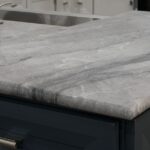Well the name is similar, are we talking about the same thing here? No, the answer to that is a sound no. That means the Quartz vs Quartzite debate goes a long way, but don’t fret, we’re here to help you out.
It’s common to stumble upon these materials when selecting the newest countertop to your construction or upgrade project. Unfortunately, we’re not always provided with enough information to select properly.
We will share with you all you need to know so you can keep your focus on selecting the countertop that better matches your kitchen.
Quartz vs Quartzite: Differences Explained
Quartz and Quartzite are both different materials, thus countertops made out of these materials present different properties and characteristics that can make one or the other the right choice for your kitchen or bathroom.
We will list down the differences while talking about origination, appearance, color, maintenance, durability, usability and price.
Origination Differences
To start it off, quartzite is a natural stone. While quartz is man-made and often called an “engineered stone“.
Quartzite stones are originally sandstone that under unthinkable heat and pressure, many kilometers deep inside the earth are fused with quartz crystals forming quartzite. This stone is mined, cut into slabs, sold and turned into tiles, backsplashes, and kitchen countertops.
Quartz is also composed mostly of quartz crystals (90-95% to be exact) but in a different way. The material is bound together by state of the art resin, and other pigments and materials are added in order to achieve virtually any look.
While quartz is not 100% natural as quartzite, that’s not a reason to ditch it all together since the end result is a durable great looking stone surface.
Appearance Differences
While quartzite can present complex veining and other patterns that make it easy to be mistaken by marble or granite. Quartz can be made to look like any stone material, if never perfectly, at least in a very eye-pleasing way.
You will have to let your eyes talk to your heart in order to decide between the unique beauty of quartzite vs quartz’s multitude of options.
Color Differences
Quartzite is normally supplied in shades of white and grey, however, minerals in the stone can grant it hues of pink and reddish-brown.
While quartz, for being man-made can be found in any imaginable color.
So if you’re looking for something very specific, maybe quartz is your best choice.
Maintenance Differences
This is another area where quartz is able to come up in front. The resin-bound surface of the stone is completely nonporous. That means it’s naturally not susceptible to stains and easy to clean. Quartz is virtually maintenance–free.
On the other hand, Quartzite, although being hard and very low on porosity, as a natural stone, requires sealing eventually. We are talking yearly sealing here, or even more spaced periods depending on the sealant, so nothing that will ruin your life, but something to consider nevertheless.
Durability Differences
The same process that makes quartz nonporous also gives it some minor flexibility, enough to make it more resistant to chipping and cracking then quartzite.
Quartzite manages to be harder though, making it less likely to scratch.
End of the day, both of the stones are very durable, and in that area, you will be safe with any of them.
Usability Difference
So how will the quartz vs quartzite debate play out on day to day usage?
It turns out that quartz is a bit more limited on usage due to 3 factors.
- You shouldn’t put hot cookware on quartz surfaces since temperatures above 300 Fahrenheit can melt the resin and create marks.
- Quartz slabs can’t be placed in areas exposed to sunlight, it dulls their color. Quartzite, on the other hand, not only looks great outside but will resist the test of the time as well.
- Cutting boards are advised for working with a knife over both surfaces, but if you forget it, you’re safer with quartzite.
Price Differences
Lastly we’ve come to price.
While depending on the project and rarity of the stone quartzite and quartz can be priced similarly, on more complex applications quartzite will show the extra price of its natural origination.
As a natural stone it can’t be supplied in any format, so some design projects will require a complicated manufacturing process that will lead to a bigger price tag.
Generally, quartz projects will be cheaper.
Choosing the right material for your countertop
As we reach the end of the quartz vs quartzite debate, we hope we’ve been able to help you see clearly.
When it comes to selecting what’s better for your kitchen, it’s usually down to appearance, usage limitations and price with these two options, so feel free to read that sections again.
You can also find more information about other stone choices on our natural stone selection section, don’t forget to read our take on quartz and quartzite.
To wrap it up, we couldn’t forget to mention that the best way to choose is to find a reputable contractor and see the options for yourself.
At Eagle Stones, our showroom is always open for you, and our team of experts will make sure you will be pleased about your new kitchen from selection to installation.



